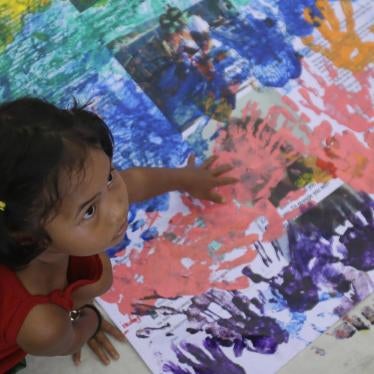Liberian government forces and rebel fighters are committing grave human rights abuses while peacekeeping forces remain inadequate, Human Rights Watch said today in a briefing paper.
A U.N. peacekeeping force of 15,000 has been proposed for deployment in October, but it could take months for the force to reach full capacity. Despite assurances by U.S. forces and the West African peacekeeping force known as ECOMIL that the situation in Liberia has stabilized, marauding armed bands continue to commit murder, rape, forced recruitment and looting.
Ragtag government militias and fighters from both rebel groups--Liberians United for Reconciliation and Democracy (LURD) and the splinter group of ex-LURD members called the Movement for Democracy in Liberia (MODEL)--operate with little discipline or command control, and loot partly because they are hungry and not being paid.
"Government and rebel fighters continue to terrorize and abuse civilians in Liberia," said Peter Takirambudde, executive director of Human Rights Watch's Africa Division. "This is a critical moment for immediate U.N. action in Liberia."
Hundreds of thousands of persons are being uprooted repeatedly as they flee from the countryside in terror and fear of these armed groups, which are seeking to secure the last spoils of battle before the territory can be secured by peacekeepers. Soldiers systematically extort money and other goods from those seeking refuge and block them from moving to safety. Fleeing civilians also fall victim to rape and abduction by the armed groups. Thousands of people remain in hiding in the bush, where adequate food, water, shelter and medical care are scarce or non-existent. Most of the population remains in grave need of basic necessities, particularly outside the capital, Monrovia.
Rape and other sexual violence against girls and women remain pervasive, and are committed by all sides in the conflict. Sexual violence often accompanies the widespread looting, and women and girls who resist providing sexual services risk being shot by the armed fighters. In northern Bong County, rape of young boys is reportedly on the rise. Rape and other forms of sexual violence have also been reported in centers for displaced persons in Monrovia, particularly where conditions are crowded, and food and other necessities must be found outside the camp.
Both the government militias and rebel fighters rely on child soldiers. Most are between thirteen and sixteen years old, but some child soldiers are as young as six years of age. Many have been forcibly recruited. Some of these child soldiers had fought in the 1990-97 war and were demobilized, only to be re-recruited with the renewal of fighting in 2000.
The fewer than 3,000 West African peacekeepers currently deployed in Liberia remain woefully inadequate. The signing of a comprehensive peace agreement on August 18 included a pact between the government and rebel forces to grant access throughout the country to humanitarian workers and organizations. However, the persistent insecurity continues to impede the delivery of humanitarian assistance to those in greatest need.
Protection of the civilian population is an urgent priority. All sectors of Liberian society, from civilians and civil society groups to fighters from all the warring parties, have repeatedly called for a prompt and more expansive deployment of ECOMIL and other international forces.
Human Rights Watch calls on the Security Council to deploy the proposed U.N. peacekeeping force of 15,000 to Liberia as soon as possible in order to protect civilians, to facilitate the delivery of humanitarian assistance, to establish conditions for the safe and sustainable return of refugees and internally displaced persons, and to support disarmament and demobilization efforts.







